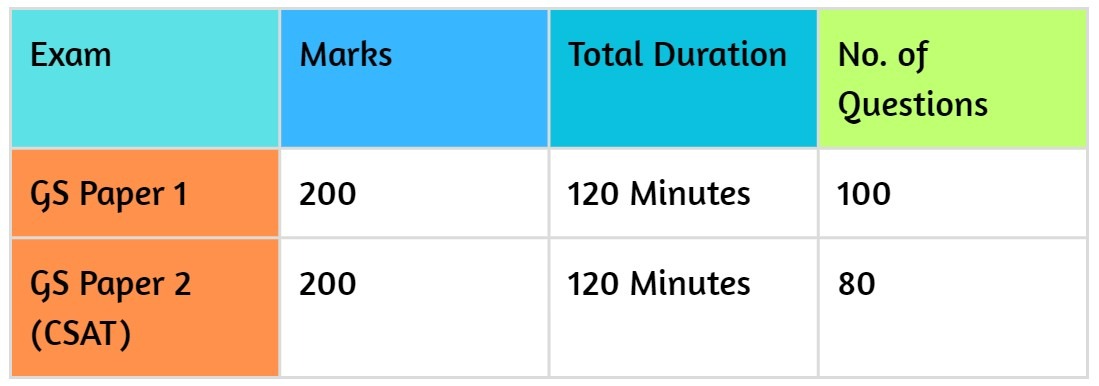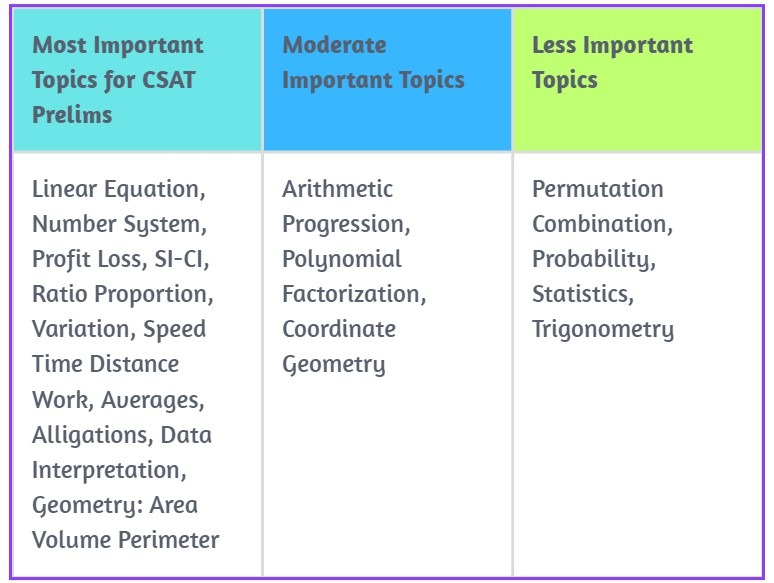How to Prepare CSAT for UPSC Prelims
![]()
"The Civil Service Aptitude Test, commonly referred to as CSAT serves as a qualifying paper in the UPSC Civil Services Preliminary examination. Candidates must attain at least 33% marks in this paper. While it might seem like a breeze, if you're acquainted with the unpredictability of the UPSC CSE, you understand that achieving the minimum marks demands thorough preparation. A well-considered strategy is essential to excel in the CSAT paper.
"Initially, it is important to highlight that CSAT requires notably less time compared to GS paper 1. You simply need to secure a minimum of 66 marks out of 200 to clear the paper. Consequently, there's no necessity for you to invest a substantial amount of time preparing for it. It evaluates a candidate's logical reasoning, analytical prowess, judgment, interpersonal skills, and reading comprehension abilities. To assist you in conquering the CSAT paper, we have devised the subsequent strategy. This approach is highly pragmatic and should be consistently adhered to."
![]()
UPSC Prelims Exam Pattern
![]()
![]()
- A total of 2 hours and 80 questions are included in the UPSC CSAT paper.
- The paper consists of 200 questions carrying 2.5 marks each.
- There is a negative marking of 0.83 marks for each incorrect answer. No marks are deducted if a question is left unattempted/unanswered.
![]()
![]()
The final list of required skills and abilities is as follows:
- Proficiency in comprehension
- Strong interpersonal skills, including effective communication
- Logical reasoning and analytical aptitude
- Competency in decision-making and problem-solving
- General mental agility
- Fundamental numeracy (numbers and their relationships, orders of magnitude, etc.), (Class X level)
- Data interpretation (charts, graphs, tables, data sufficiency, etc.), (Class X level)
![]()
Expert Tips to Excel in UPSC Paper 2 (CSAT)
![]()
1. Take UPSC CSAT very seriously
![]()
- Many students tend to overlook the importance of CSAT since it is of a qualifying nature. However, keep in mind that even if you score high in General Studies Paper-I, you may not qualify for the Mains examination if you do not pass CSAT.
- While preparing for Prelims, make sure you devote enough time to CSAT preparation. The syllabus is well-defined and can be easily mastered through practice.
- Allocate one to two hours of daily preparation for CSAT. This is more than enough to pass the exam.
- Test your knowledge by reviewing your notes or solving a CSAT mock test every Sunday. This will help you stay ahead of the game.
2. Analyze yourself before starting the preparation
![]()
- Before you start preparing, it's important to assess your strengths and weaknesses in relation to the exam.
- Solve previous year's papers and evaluate them to pinpoint your weak areas. This will give you an idea of your readiness.
- Scoring above 100 indicates that you are well above the qualifying standard and do not require further preparation.
- However, if your score is less than 100, focus on the simpler topics that require less preparation after identifying your weak areas.
- No matter how low your score is, start working on the areas that need improvement immediately to stay on track.
3. Get a comprehensive UPSC CSAT manual
![]()
- Various CSAT manuals have been released by reputable publishers. However, "The CSAT Manual" by Tata McGraw Hill is often regarded as the most beneficial resource. This booklet serves as a comprehensive guide that caters to all of your preparation needs, making it an invaluable tool.
- It's not necessary to read the entire book cover to cover to reap the benefits. The book is divided into sections, allowing you to select the ones that align with your interests. Each topic covered is explored in-depth, and with just a few minutes of practice and revision, you can quickly enhance your knowledge and skills.
4. Practice Online Mock Test Series
![]()
- Consider taking a test series from a reputable coaching center to help you prepare for the exam. This can help you stay on top of your game and familiarize you with the exam pattern and syllabus.
- It's important to practice for at least an hour a day, but this can be adjusted based on individual needs. One mock paper per week may be enough for some.
- Remember that it's not enough to simply know the subject matter; you must also be able to solve problems within the time allotted. Therefore, consistent practice is essential.
- Mock exams are a great way to get meaningful practice and improve your speed and accuracy. Consider taking practice tests every Sunday to help sharpen your skills.
![]()
Best Strategy to Prepare UPSC CSAT
![]()
Tips to prepare for English Comprehension
![]()
- Enhance your reading and comprehension by regularly reading Hindu Editorials.
- Improve your grammar by reading Wrenn Martin's English Grammar and Composition or SP Bakshi's Objective General English.
- Boost your vocabulary, reading and comprehension skills by reading short English books.
- Learn new words by reading a lot, using flashcards, or trying out Vocabulary modules.
Tips to prepare Maths and Logical Reasoning for CSAT
![]()
To ace the CSAT prelims, you must first understand the fundamentals of each subject. Our CSAT classes are designed to help you get comfortable with the basics.
To get a sense of how much study material is required for each subject, review past year's papers.
Practice makes perfect – make sure to keep practicing to reinforce what you've learned.
Many aspirants find Maths to be daunting and time-consuming. However, it's not necessary to cover every topic in advance. Instead, refer to the table below and select the most important topics. Additionally, evaluate the difficulty of questions using past year's papers to prepare for this subject.
![]()
![]()
*In conclusion**
Before concluding this strategy, let's review some key fundamentals to keep in mind. It's crucial to maintain a sense of calm, focus, and motivation while revising. The more you revise, the better you remember what you've learned. Thus, it's recommended to revise at least once a week, if not more frequently. Remember, you can't cover everything at once, so take it one step at a time and maintain your focus and discipline. The more you can ease up on yourself, the better off you'll be in the long run. Avoid pushing yourself too hard and never start a topic you can't finish in one day. Instead of rushing through unfinished work, take the time to go back and rewrite your drafts. Lastly, keep yourself motivated throughout the entire CSE year by telling yourself that you can succeed.
It's important to maintain a high level of motivation because if you lose it, your everyday studies will become tedious, and you won't enjoy the process of preparing for the CSE at all. In conclusion, remember that "uncertainty is most painful," as you have no idea how the Prelims exams will be set. However, have confidence and rely on the method that many others have used to great effect. Start your preparations as soon as you finish reading this article, and we wish you the best of luck!

















